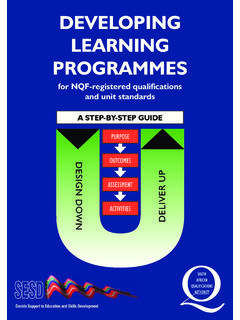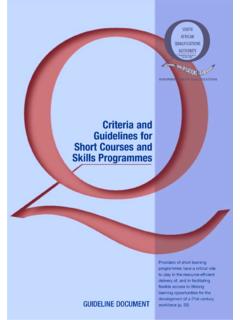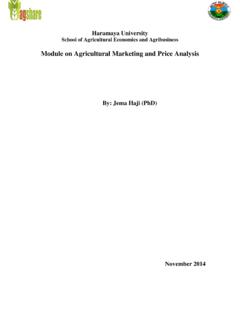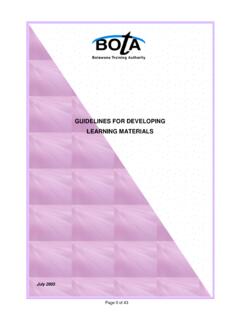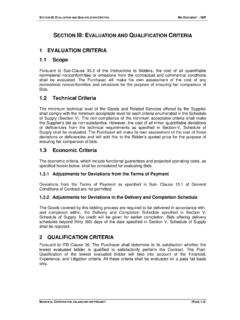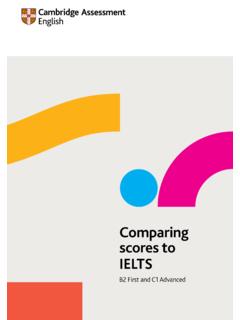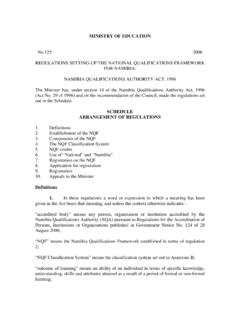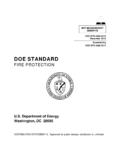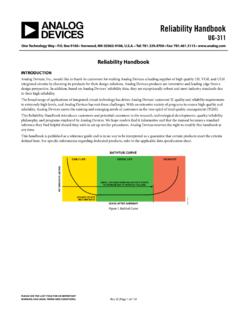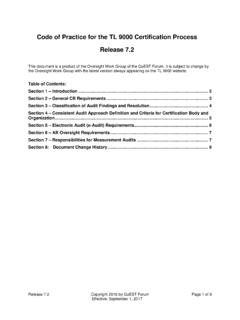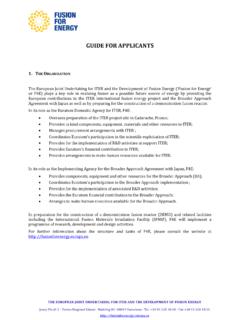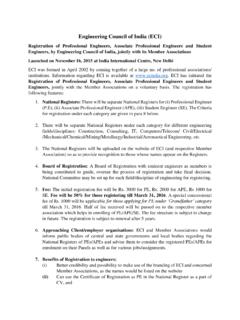Transcription of CRITERIA AND GUIDELINES FOR THE EVALUATION …
1 CRITERIA AND GUIDELINES FOR. THE EVALUATION OF FOREIGN. QUALIFICATIONS. THE SOUTH AFRICAN. QUALIFICATIONS AUTHORITY. CONTENTS. LIST OF ACRONYMS I. DEFINITIONS II. INTRODUCTION 1. Chapter 1 The recognition of foreign qualifications 3. 1 What is meant by the recognition of foreign qualifications? 3. 2 A closer look at the concept 4. Recognition versus equivalence 4. Recognition versus EVALUATION 5. Academic versus professional recognition 5. Chapter 2 The recognition of foreign qualifications in South Africa 7. 1 Roles in the recognition process 7. A national centre for recognition advice 8. Centre for the EVALUATION of Educational Qualifications 9. Competent recognition authorities 11. Competent authorities for academic recognition 11. Competent authorities for professional recognition 12. Other role players 13.
2 2 Relationships and ensuing responsibilities 13. Chapter 3 CRITERIA and GUIDELINES for the EVALUATION of foreign qualifications 17. 1 Guiding principles 17. A comparative approach 17. Access to the EVALUATION service 17. EVALUATION without prejudice 17. Fair, transparent, coherent and reliable CRITERIA 18. Professional integrity 18. Consistency of evaluations 18. C RITERIA AND G UIDELINES FOR THE E VALUATION OF F OREIGN Q UALIFICATIONS THE SOUTH AFRICAN QUALIFICATIONS AUTHORITY. 2 Procedural GUIDELINES 18. Information 18. Processing time and delay 19. Fees 19. Documentary requirements 20. Right of appeal 20. 3 The process for evaluating foreign qualifications 20. 4 CRITERIA for EVALUATION 21. The origin of education and training systems 22. Status of the awarding institution 22. Key elements of the programme leading to the qualification 22.
3 Qualifications frameworks 23. General considerations 23. 5 The SAQA Certificate of EVALUATION 24. LIST OF SOURCES 27. ANNEXURES 29. A Partnership evaluations: case study 29. B List of statutory professional bodies 31. C The CEEQ application guide 33. D The CEEQ application form 37. E Information leaflet advising on the upgrading of ordinary level and related subjects 39. F Schematic outline of the process flow for EVALUATION of foreign qualifications by the CEEQ at SAQA 41. G Certificate samples 44. THE SOUTH AFRICAN QUALIFICATIONS AUTHORITY C RITERIA AND G UIDELINES FOR THE E VALUATION OF F OREIGN Q UALIFICATIONS. LIST OF ACRONYMS. ACE Admissions Officers and Credential Evaluators (a professional section of the European Association for International Education). AEI-NOOSR International Education Network / National Office of Overseas Skills Recognition CEEQ Centre for the EVALUATION of Educational Qualifications CICIC Canadian Information Centre for International Credentials CTP Committee of Technikon Principals DoE Department of Education DoL Department of Labour EAIE European Association for International Education EU European Union HESA Higher Education South Africa HSRC Human Sciences Research Council ICES International Credential EVALUATION Service IQAS International Qualifications Assessment Service NACES National Association of Credential EVALUATION Services (USA).
4 NAFSA Association of International Educators NARIC National Academic Recognition Information Centre NQF National Qualifications Framework PAC Provincial Assessment Committee RPL Recognition of Prior Learning RVQ Relative Value Coefficient SAQA South African Qualifications Authority SAUVCA South African Universities Vice Chancellors Association SEC Service des valuations Comparatives (Canada). UK NARIC National Academic Recognition Information Centre for the United Kingdom C RITERIA AND G UIDELINES FOR THE E VALUATION OF F OREIGN Q UALIFICATIONS THE SOUTH AFRICAN QUALIFICATIONS AUTHORITY I. DEFINITIONS. The purpose of this glossary is to define terms as generally used in international tools and instruments for recognition of qualifications. It should be noted, however, that the terms are used somewhat differently depending on the country and the context, and some of the terms were created or adapted to specifically suit the South African situation.
5 Academic recognition The recognition of (foreign) qualifications for the purpose of further studies. Access The general right to be considered for admission to a further level of education and training, or to compete for a job. Access qualification Any qualification issued by a competent authority attesting the successful completion of an education and training programme, and giving the holder the right to be considered for admission to a particular programme of learning. Admission The procedure or system for allowing qualified applicants to pursue studies in a programme offered by the institution concerned. Admission is usually based on specified selection CRITERIA . Competent recognition authority A body officially charged with making binding decisions on the recognition of (foreign) qualifications. Credentials Qualifications.
6 In some countries the terms credentials and qualifications are used interchangeably. In South Africa qualifications is the preferred term. De facto recognition The recognition of qualifications aimed at non-regulated professions /. careers. De jure recognition The recognition of qualifications aimed at regulated professions ( law, medicine, accounting ). EVALUATION of (foreign) qualifications The analysis and written appraisal, by a competent body, of an individual's (foreign) qualifications. Assessment is sometimes used interchangeably with EVALUATION , but in South African official usage, the activity is more correctly seen as EVALUATION . II THE SOUTH AFRICAN QUALIFICATIONS AUTHORITY C RITERIA AND G UIDELINES FOR THE E VALUATION OF F OREIGN Q UALIFICATIONS. Higher education (and training). All levels of post-secondary education and training which are recognised by the relevant authorities in a particular country as belonging to its higher education (and training) system.
7 Higher education (and training) qualification Any degree, diploma or other certificate issued by a competent authority attesting the successful completion of a higher education programme. Higher education institution An establishment providing higher education and training recognised by the relevant authorities in a particular country as belonging to its system of higher education and training. Professional recognition Recognition for the purpose of employment. Programme (of study). A course of study recognised by the relevant authority as belonging to its formal, national system of education and training and leading to a recognised qualification. Recognition The formal acknowledgement by the competent authorities in a particular country of the appropriateness of a foreign qualification for access to related educational and/or employment opportunities in the receiving country.
8 Regulated profession A profession where access, qualifications, conduct and so forth are governed by statutory requirements. Requirements Conditions that must be fulfilled for access or for admission to education and training programmes (or to employment). General requirements Conditions that must in all cases be fulfilled for admission to a given level of higher education, or for the award of a higher education qualification at a given level. Specific requirements Conditions that must be fulfilled, in addition to the general requirements, in order to gain admission to a particular higher education programme, or to be awarded a specific higher education qualification in a particular field of study. Study period Any component of an education and training programme which represents the acquisition of significant knowledge or skill without being regarded as a complete programme of study in itself.
9 For purposes of recognition a study period must have been completed, evaluated and documented. C RITERIA AND G UIDELINES FOR THE E VALUATION OF F OREIGN Q UALIFICATIONS THE SOUTH AFRICAN QUALIFICATIONS AUTHORITY III. Sworn Translation An official document constituting the verbatim (word for word) translation, by a legally sworn or certified translator, from a foreign language into English. IV THE SOUTH AFRICAN QUALIFICATIONS AUTHORITY C RITERIA AND G UIDELINES FOR THE E VALUATION OF F OREIGN Q UALIFICATIONS. INTRODUCTION. The Centre for the EVALUATION of Educational Qualifications (CEEQ) is an operational unit of the South African Qualifications Authority (SAQA). SAQA. oversees the development and implementation of the National Qualifications Framework (NQF). The CEEQ's work gives particular expression to one of the objectives of the NQF: to facilitate access to, and mobility and progression within, education, training and career paths.
10 The EVALUATION function of the CEEQ forms part of a bigger picture: the recognition of foreign qualifications in general. The CRITERIA and GUIDELINES for the EVALUATION of Foreign Qualifications is intended to clarify the relationship between EVALUATION and recognition of qualifications a distinction which is often misunderstood. The publication offers a brief history of the EVALUATION and recognition of foreign qualifications, showing among other things the changes from a time-based approach to an outcomes-based approach, and from the idea of equivalence to the idea of comparability. In the process, important distinctions are drawn between the roles of agencies concerned with EVALUATION and recognition. This helps to: clarify jurisdictions;. give an overview of various practices for reference purposes; and describe relationships in the recognition process.
